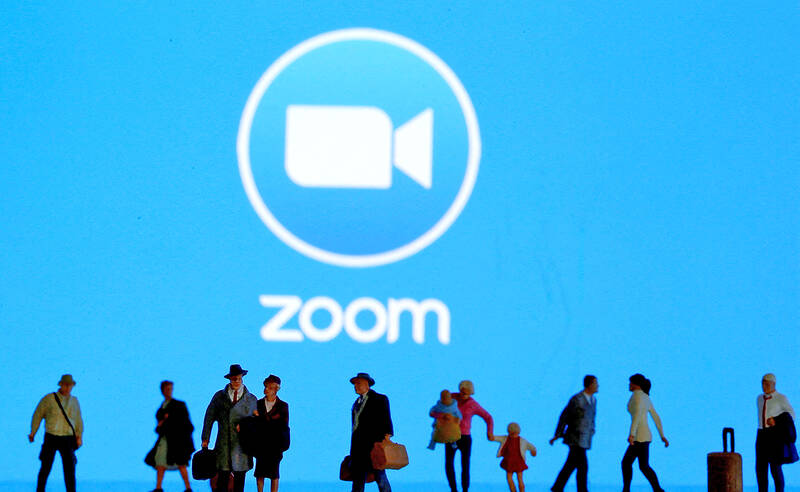Cyberconferencing company Zoom Video Communications Inc yesterday began operating a cloud computing data center in Taiwan, after becoming the first US company to pass the government’s mobile application basic security test.
Zoom has met the two main requirements for overseas cyberconferencing companies set by the government in 2020 — operating servers locally and passing a cybersecurity test conducted by a third party, the company said in a statement.
The iOS and Android versions of its mobile applications passed the test conducted by the government-sponsored Telecom Technology Center, it said.

Photo: REUTERS
The inauguration of the data center marked a milestone in the California-headquartered firm’s development, Zoom product and engineering president Velchamy Sankarlingam said, adding that he expects Zoom to play a key role in many sectors in Taiwan.
The company’s security had been questioned by the government as recently as 2020 when the Executive Yuan mentioned Zoom in an advisory, saying that people should be aware of information security risks when using cyberconferencing platforms.
The advisory came shortly after the platforms’ popularity surged amid the COVID-19 pandemic.
“Should it become operationally necessary to engage in videoconferencing, the underlying video software to be used should not have associated security or privacy concerns, such as the Zoom video communication service,” the Executive Yuan said.

NEW IDENTITY: Known for its software, India has expanded into hardware, with its semiconductor industry growing from US$38bn in 2023 to US$45bn to US$50bn India on Saturday inaugurated its first semiconductor assembly and test facility, a milestone in the government’s push to reduce dependence on foreign chipmakers and stake a claim in a sector dominated by China. Indian Prime Minister Narendra Modi opened US firm Micron Technology Inc’s semiconductor assembly, test and packaging unit in his home state of Gujarat, hailing the “dawn of a new era” for India’s technology ambitions. “When young Indians look back in the future, they will see this decade as the turning point in our tech future,” Modi told the event, which was broadcast on his YouTube channel. The plant would convert

‘SEISMIC SHIFT’: The researcher forecast there would be about 1.1 billion mobile shipments this year, down from 1.26 billion the prior year and erasing years of gains The global smartphone market is expected to contract 12.9 percent this year due to the unprecedented memorychip shortage, marking “a crisis like no other,” researcher International Data Corp (IDC) said. The new forecast, a dramatic revision down from earlier estimates, gives the latest accounting of the ongoing memory crunch that is affecting every corner of the electronics industry. The demand for advanced memory to power artificial intelligence (AI) tasks has drained global supply until well into next year and jeopardizes the business model of many smartphone makers. IDC forecast about 1.1 billion mobile shipments this year, down from 1.26 billion the prior

People stand in a Pokemon store in Tokyo on Thursday. One of the world highest-grossing franchises is celebrated its 30th anniversary yesterday.

Zimbabwe’s ban on raw lithium exports is forcing Chinese miners to rethink their strategy, speeding up plans to process the metal locally instead of shipping it to China’s vast rechargeable battery industry. The country is Africa’s largest lithium producer and has one of the world’s largest reserves, according to the US Geological Survey (USGS). Zimbabwe already banned the export of lithium ore in 2022 and last year announced it would halt exports of lithium concentrates from January next year. However, on Wednesday it imposed the ban with immediate effect, leaving unclear what the lithium mining sector would do in the